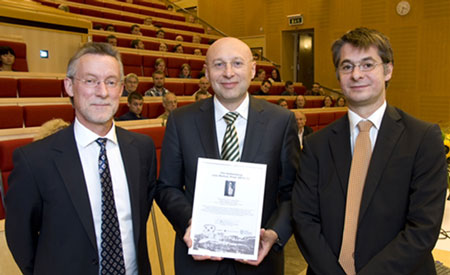| Sep 22, 2011 |
Gothenburg Lise Meitner Prize 2010/2011 goes to Stefan Hell
|
|
(Nanowerk News) On Friday, September 16, 2011, Stefan W. Hell, head of the Department of NanoBiophotonics at the Max Planck Institute for Biophysical Chemistry in Göttingen, received the Gothenburg Lise Meitner Prize "for his groundbreaking development of light microscopy and its applications in biological settings". The prize is awarded annually by Fysicum, a collaboration of the faculties of Physics of the Chalmers University of Technology and the University of Gothenburg, Sweden.
|
|
"Professor Hell is bestowed the prize for his groundbreaking development of light microscopy and its applications in biological settings. Apart from scientific excellence, he has taken on the challenge of bridging borders between different scientific disciplines to address important problems – not always the easiest task", commented the committee. Hell was the first to suggest and experimentally find a method to overcome the diffraction limited resolution barrier in light microscopy.
|
 |
| Professor Bengt E.W. Nilsson, chair of the Lise Meitner committee, and Professor Aleksandar Matic, Chalmers, awarded the Gothenburg Lise Meitner Prize to Stefan Hell.
|
|
Conventional light microscopes cannot distinguish objects that lie closer together than 200 nanometers. For biologists, who depend on light microscopes when observing processes in living cells, this means a massive limitation. For them, much smaller structures in living cells are of great interest.
|
|
With STED (Stimulated Emission Depletion) microscopy, Hell uses a simple trick to surmount the resolution barrier: He makes the details dark that are close together so that they do not become visible at the same time, but shortly one after another. With this technique, it is now possible to observe structures in living cells with a resolution up to ten times higher than with conventional light microscopes. "Theoretically speaking, there is no lower limit – up to the single molecule," explains the physicist. His ambition for the future is to take even deeper looks into the world of living cells.
|
|
About the Lise Meitner Prize
|
|
Lise Meitner (1878-1968) was an Austrian-Swedish nuclear physicist. She carried out research at the Kaiser Wilhelm Institute for Chemistry in Berlin before she had to flee abroad in 1938 because of her Jewish origin. In Kungälv near Gothenburg, Sweden, she together with her nephew Otto Frisch made history: Analyzing the experiments of her German colleague Otto Hahn in Berlin, she found out that the atomic nucleus could be split under a huge emission of energy by bombarding it with neutrons. With these findings, she had discovered a fundamental element of nuclear fission.
|
|
The Gothenburg Lise Meitner Prize was established in 2006 by the Swedish research association Fysicum. This is a collaboration of the departments for fundamental physics and for Physical Technology of the Chalmers University of Technology as well as the faculty of physics of the University of Gothenburg. Fysicum awards the prize to scientists who have made fundamental discoveries in physics under difficult conditions. With the prize, the awardee is conferred 10,000 Swedish Crowns (approximately 1,000 Euro).
|
|
About the awardee
|
|
Stefan W. Hell received his PhD in physics at the University of Heidelberg in 1990 and worked at the European Laboratory for Molecular Biology in Heidelberg from 1991 to 1993. From 1993 to 1996, he carried out research at the Universities of Turku (Finland) and Oxford (Great Britain). Subsequently, he obtained his "habilitation" at the University of Heidelberg. In 1997, he went to the Max Planck Institute for Biophysical Chemistry as head of the High-Resolution Optical Microscopy Research Group. He was appointed Director at the institute in 2002 and has been heading the Department of NanoBiophotonics since then. Stefan Hell has received many awards for his research, among them the 10th German Future Prize of the Federal President (2006), the Gottfried Wilhelm Leibniz Prize as well as the State Prize of Lower Saxony (both in 2008). The Otto Hahn Prize for Physics followed in 2008. On September 7, 2011, Hell was awarded this year's Körber European Science Prize.
|

